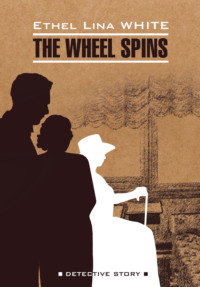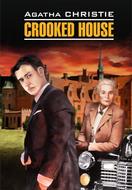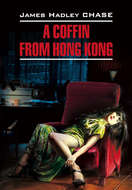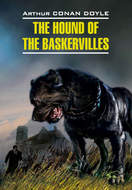Czytaj książkę: «Колесо крутится. Леди исчезает / The Wheel Spins. The Lady Vanishe»
© КАРО, 2020
Все права защищены
Chapter one. Without regret
The day before the disaster, Iris Carr had her first premonition of danger. She was used to the protection of a crowd, whom – with unconscious flattery – she called “her friends.” An attractive orphan of independent means, she had been surrounded always with clumps of people. They thought for her – or rather, she accepted their opinions, and they shouted for her – since her voice was rather too low in register, for mass social intercourse.
Their constant presence tended to create the illusion that she moved in a large circle, in spite of the fact that the same faces recurred with seasonal regularity. They also made her pleasantly aware of popularity. Her photograph appeared in the pictorial papers through the medium of a photographer’s offer of publicity, after the Press announcement of her engagement to one of the crowd.
This was Fame.
Then, shortly afterwards, her engagement was broken, by mutual consent – which was a lawful occasion for the reproduction of another portrait. More Fame. And her mother, who died at her birth, might have wept or smiled at these pitiful flickers of human vanity, arising, like bubbles of marsh-gas, on the darkness below.
When she experienced her first threat of insecurity, Iris was feeling especially well and happy after an unconventional health-holiday. With the triumph of near-pioneers, the crowd had swooped down on a beautiful village of picturesque squalor, tucked away in a remote corner of Europe, and taken possession of it by the act of scrawling their names in the visitors’ book.
For nearly a month they had invaded the only hotel, to the delighted demoralisation of the innkeeper and his staff. They scrambled up mountains, swam in the lake, and sunbathed on every available slope. When they were indoors, they filled the bar, shouted against the wireless, and tipped for each trifling service. The proprietor beamed at them over his choked cash-register, and the smiling waiters gave them preferential treatment, to the legitimate annoyance of the other English guests.
To these six persons, Iris appeared just one of her crowd, and a typical semi-Society girl – vain, selfish, and useless. Naturally, they had no knowledge of redeeming points – a generosity which made her accept the bill, as a matter of course, when she lunched with her “friends,” and a real compassion for such cases of hardship which were clamped down under her eyes.
But while she was only vaguely conscious of fugitive moments of discontent and self-contempt, she was aware of a fastidious streak, which kept her aloof from any tendency to saturnalia. On this holiday she heard Pan’s pipes, but had no experience of the kick of his hairy hind quarters.
Soon the slack convention of the crowd had been relaxed. They grew brown, they drank and were merry, while matrimonial boundaries became pleasantly blurred. Surrounded by a mixed bag of vague married couples, it was a sharp shock to Iris when one of the women – Olga – suddenly developed a belated sense of property, and accused her of stealing a husband.
Besides the unpleasantness of the scene, her sense of justice was outraged. She had merely tolerated a neglected male, who seemed a spare part in the dislocated domestic machine. It was not her fault that he had lost his head.
To make matters worse, at this crisis, she failed to notice any signs of real loyalty among her friends, who had plainly enjoyed the excitement. Therefore, to ease the tension, she decided not to travel back to England with the party, but to stay on for two days longer, alone.
She was still feeling sore, on the following day, when she accompanied the crowd to the little primitive railway station. They had already reacted to the prospect of a return to civilisation. They wore fashionable clothes again, and were roughly sorted into legitimate couples, as a natural sequence to the identification of suitcases and reservations.
The train was going to Trieste, which was definitely on the map. It was packed with tourists, who were also going back to pavements and lamp-posts. Forgetful of hillside and starlight, the crowd responded to the general noise and bustle. It seemed to recapture its old loyalty as it clustered round Iris.
“Sure you won’t be bored, darling?”
“Change your mind and hop on.”
“You’ve simply got to come.”
As the whistle was blown, they tried to pull her into their carriage – just as she was, in shorts and nailed boots, and with a brown glaze of sunburn on her unpowdered face. She fought like a boxing-kangaroo to break free, and only succeeded in jumping down as the platform was beginning to slide past the window.
Laughing and panting from the struggle, she stood and waved after the receding train, until it disappeared round the bend of the gorge.
She felt almost guilty as she realised her relief at parting from her friends. But, although the holiday had been a success, she had drawn her pleasure chiefly from primeval sources – sun, water, and mountain-breeze. Steeped in Nature, she had vaguely resented the human intrusion.
They had all been together too closely and too intimately. At times, she had been conscious of jarring notes – a woman’s high thin laugh – the tubby outline of a man’s body, poised to dive – a continual flippant appeal to “My God.”
It was true that while she had grown critical of her friends she had floated with the current. Like the others, she had raved of marvellous scenery, while she accepted it as a matter of course. It was a natural sequence that, when one travelled off the map, the landscape improved automatically as the standard of sanitation lapsed.
At last she was alone with the mountains and the silence. Below her lay a grass-green lake, sparkling with diamond reflections of the sun. The snowy peaks of distant ranges were silhouetted against a cornflower-blue sky. On a hill rose the dark pile of an ancient castle, with its five turrets pointing upwards, like the outspread fingers of a sinister hand.
Everywhere was a riot of colour. The station garden foamed with exotic flowers – flame and yellow – rising from spiked foliage. Higher up the slope, the small wooden hotel was painted ochre and crimson lake. Against the green wall of the gorge rose the last coil of smoke, like floating white feathers.
When it had faded away, Iris felt that the last link had been severed between her and the crowd. Blowing a derisive kiss, she turned away and clattered down the steep stony path. When she reached the glacier-fed river, she lingered on the bridge, to feel the iced air which arose from the greenish-white boil.
As she thought of yesterday’s scene, she vowed that she never wanted to see the crowd again. They were connected with an episode which violated her idea of friendship. She had been a little fond of the woman, Olga, who had repaid her loyalty by a crude exhibition of jealousy.
She shrugged away the memory. Here, under the limitless blue, people seemed so small – their passions so paltry. They were merely incidental to the passage from the cradle to the grave. One met them and parted from them, without regrets.
Every minute the gap between her and them was widening. They were steaming away, out of her life. At the thought, she thrilled with a sense of new freedom, as though her spirit were liberated by the silence and solitude.
Yet, before many hours had passed, she would have bartered all the glories of Nature to have called them back again.
Chapter two. The threat
Some four hours later Iris lay spread-eagled on a slope of the mountain, high above the valley. Ever since she had left the chill twilight of the gorge, at a shrine which marked a union of paths, she had been climbing steadily upwards, by a steep zigzag track.
After she had emerged from the belt of shadow, the sun had beat fiercely through her, but she did not slacken her pace. The fury of her thoughts drove her on, for she could not dislodge Olga from her mind.
The name was like a burr on her brain. Olga. Olga had eaten her bread, in the form of toast – for the sake of her figure – and had refused her salt, owing to a dietetic fad. This had made trouble in the kitchen. Olga had used her telephone, and mis-used her car. Olga had borrowed her fur coat, and had lent her a superfluous husband.
At the memory of Olga’s Oscar, Iris put on a sprint.
“As if I’d skid for a man who looks like Mickey Mouse,” she raged.
She was out of breath when, at last, she threw herself down on the turf and decided to call it a day. The mountain which had challenged her kept withdrawing as she advanced, so she had to give up her intention to reach the top.
As she lay with her eyes almost closed, listening to the ping of the breeze, her serenity returned. A clump of harebells, standing out against the skyline, seemed hardened and magnified to a metallic belfry, while she, herself, was dwarfed and welded into the earth – part of it, like the pebbles and the roots. In imagination she could almost hear the pumping of a giant heart underneath her head.
The moment passed, for she began to think of Olga again. This time, however, she viewed her from a different standpoint, for the altitude had produced the usual illusion of superiority. She reminded herself that the valley was four thousand feet above sea-level, while she had mounted about five thousand feet.
On the basis of this calculation she could afford to be generous, since she was nine thousand feet taller than her former friend – assuming, of course, that Olga was obliging enough as to remain at sea-level.
She decided to wash out the memory as unworthy of further anger.
“But never again,” she said. “After this, I’ll never help any one again.”
Her voice had the passionate fervour of one who dedicates herself to some service. With the virtuous feeling of having profited by a lesson, for which heavy fees had been paid, she smoked a cigarette before the return journey. The air was so clear that mountains she had never seen before quivered out of invisibility and floated in the sky, in mauve transparencies. Far below she could see an arm of the lake – no longer green, but dimmed by distance to a misted blue.
Reluctantly she rose to her feet. It was time to go.
The descent proved not only monotonous, but painful, for the continual backward jolt of her weight threw a strain on unexercised muscles. Her calves began to ache and her toes were stubbed on the stony path.
Growing impatient, she decided to desert the zigzag, in favour of a direct short-cut down the face of the mountain. With the lake as a guide to direction, she hurled herself down the slope.
It was a bold venture, but almost immediately she found that the gradient was too steep. As she was going too quickly to stop, her only course was to drop down to a sitting posture and glissade over the slippery turf – trusting to luck.
From that moment things happened quickly. Her pace increased every second, in spite of her efforts to brake with her feet. Patches of blue and green sped past her, as the valley rushed up to meet her, and smashed into the sky. Bumping over the rough ground, she steered towards a belt of trees at the bottom, in the hope that they might save her from a complete spill.
Unfortunately they proved to be rotten from age, and she crashed through them, to land with a bump in the middle of the stony pass.
Her fall had been partially broken, but she felt very sore and shaken as she scrambled to her feet. In spite of her injuries, she did not forget to give the forced laugh which had been drilled into her, at school, as the accompaniment to any game’s casualty.
“Rather amusing,” she murmured, picking splinters out of her legs.
But she was pleased to notice the shrine, a few yards farther up the track, for this was a definite tribute to her steering. As she was not far from the hotel, she clattered down the gully, thinking of the comforts which awaited her. A long cold drink, a hot bath, dinner in bed. When she caught sight of a gleam of water, at the bend of the gorge, in her eagerness she broke into a limping run.
She rounded the corner and then stopped, staring before her in utter bewilderment. All the familiar landmarks had disappeared, as though some interfering person had passed an india-rubber over the landscape. There were no little wooden houses, no railway station, no pier, no hotel.
With a pang of dismay she realised that she had steered by a faulty compass. This was not their familiar green lake, in which she and her friends had bathed daily. Instead of being deep and ovoid in shape, it was a winding pale-blue mere, with shallow rushy margins.
In the circumstances, there was but one thing to do – retrace her steps back to the shrine and follow the other gully.
It was definitely amusing and she achieved quite a creditable laugh before she began to plod slowly upwards again.
Her mood was too bleak for her to appreciate the savage grandeur of the scenery. It was a scene of stark desolation, riven by landslips and piled high with shattered rocks. There was no crop of vegetation amid the boulders – no chirp of bird. The only sounds were the rattle of loose stones, dislodged by her feet, and the splash of a shrunken torrent, which foamed over its half-dried course, like a tangled white thread.
Used to perpetual company, Iris began to long for faces and voices. In her loneliness, she was even reduced to the flabbiness of self-pity. She reminded herself that, when she returned to England, she would not go home, like others. She would merely go back.
At present she was living at an hotel, for she had sublet her small luxury flat. Although her mode of living was her own choice, at such a time and such a place she felt that she had paid a high price for freedom.
Her mood did not last, for, at the top of the pass, she was faced with a call upon her fortitude. Casting about, to pick up her bearings, she made the discovery that the shrine was different from the original landmark where she had struck the mountain zigzag.
This time she did not laugh, for she felt that humour could be carried too far. Instead she was furious with herself. She believed that she knew these mountains, because, with the others, she had clattered up and down the gorges, like a pack of wild goats.
But she had merely followed – while others led. Among the crowd was the inevitable leader – the youth with the map.
Thrown on her own resources, she had not the least idea of her direction. All she could do was to follow the gorge up to its next ramification and trust to luck.
“If I keep on walking, I must get somewhere,” she argued. “Besides, no one can get lost who has a tongue.”
She had need of her stoicism, for she had grown desperately weary, in addition to the handicap of a sore heel. When, at last, she reached a branch which gave her a choice of roads, she was too distrustful of her own judgement to experiment. Sitting down on a boulder, she waited on the chance of hailing some passer-by.
It was her zero-hour, when her independence appeared only the faculty to sign cheques drawn on money made by others – and her popularity, but a dividend of the same cheques.
“I’ve been carried all my life,” she thought. “And even if some one comes, I’m the world’s worst linguist.”
The description flattered her, for she had not the slightest claim to the title of linguist. Her ignorance of foreign languages was the result of being finished at Paris and Dresden. During the time she was at school, she mixed exclusively with other English girls, while the natives who taught her acquired excellent English accents.
This was her rendering of the line in the National Anthem—”Send us victorious.”
Patriotism did not help her now, for she felt slightly doubtful when a thick-set swarthy man, wearing leather shorts and dirty coloured braces, swung up the pass.
Among Iris’ crowd was a youth who was clever at languages. From his knowledge of common roots, he had managed to use German as a kind of liaison language; but he had to draw on his imagination in order to interpret and be understood.
Iris had a vivid recollection of how the crowd used to hoot with derision at his failures, when she called out to the man in English and asked him to direct her to the village.
He stared at her, shrugged, and shook his head.
Her second attempt – in a louder key – met with no better success. The peasant, who seemed in a hurry, was passing on, when Iris barred his way.
She was acutely aware of her own impotence, as though she were some maimed creature, whose tongue had been torn out. But she had to hold his attention, to compel him to understand. Feeling that she had lapsed from the dignity of a rational being, she was forced to make pantomimic gestures, pointing to the alternative routes in turn, while she kept repeating the name of the village.
“He must get that, unless he’s an idiot,” she thought.
The man seemed to grasp her drift, for he nodded several times. But, instead of indicating any direction, he broke into an unfamiliar jargon.
As Iris listened to the torrent of guttural sounds, her nerve snapped suddenly. She felt cut off from all human intercourse, as though a boundary-line had been wiped out, and – instead of being in Europe – she were stranded in a corner of Asia.
Without money and without a common language, she could wander indefinitely. At that moment she might be headed away from the village and into the wilds. The gorge had many tributary branches, like the windings of an inland sea.
As she grew afraid, the peasant’s face began to waver, like the illusion of some bad dream. She noticed that his skin glistened and that he had a slight goitre; but she was definitely conscious of his steamy goatish smell, for he was sweating from his climb.
“I can’t understand you,” she cried hysterically. “I can’t understand one word. Stop. Oh, stop. You’ll drive me mad.”
In his turn the man heard only a string of gibberish. He saw a girl, dressed like a man, who was unattractively skinny – according to the local standard of beauty – with cut dirty knees. She was a foreigner, although he did not know her nationality. Further, she was worked up to a pitch of excitement, and was exceptionally stupid.
She did not seem to grasp that she was telling him less than half the name of the village, whereas three different hamlets had the same prefix. He had explained this to her, and asked for the full word.
Iris could not have supplied it even if she had understood the man. The name of the village was such a tongue-twister that she had never tried to disentangle it, but, like the rest, had called it by its first three syllables.
The position was stalemate. With a final grimace and shrug, the peasant went on his way, leaving Iris alone with the mountains.
They overhung her like a concrete threat. She had bought picture postcards of them and broadcast them with the stereotyped comment—”Marvellous scenery.” Once she had even scrawled “This is my room,” and marked a peak with a derisive cross.
Now – the mountains were having their revenge. As she cowered under the projecting cliffs, she felt they had but to shake those towering brows, to crush her to powder beneath an avalanche of boulders. They dwarfed her to insignificance. They blotted out her individuality. They extinguished her spirit.
The spell was broken by the sound of English voices. Round the bend of the pass came the honeymoon couple, from the hotel.
This pair of lovers was respected even by the crowd, for the completeness of their reserve and the splendour of their appearance. The man was tall, handsome, and of commanding carriage. His voice was authoritative, and he held his head at an angle which suggested excessive pride. Waiters scampered at his nod, and the innkeeper— probably on the strength of his private sitting-room – called him “Milord.”
His wife was almost as tall, with a perfect figure and a flawless face. She wore beautiful clothes which were entirely unsuitable for the wilds; but it was obvious that she dressed thus as a matter of course, and to please only her husband.
They set their own standard and appeared unconscious of the other visitors, who accepted them as belonging to a higher social sphere. It was suspected that the name “Todhunter,” under which they had registered, was a fiction to preserve their anonymity.
They passed Iris almost without notice. The man raised his hat vaguely, but his glance held no recognition. His wife never removed her violet eyes from the stony track, for her heels were perilously high.
She was speaking in a low voice, which was vehement in spite of its muffled tone.
“No darling. Not another day. Not even for you. We’ve stayed too—”
Iris lost the rest of the sentence. She prepared to follow them at a discreet distance, for she had become acutely aware of her own wrecked appearance.
The arrival of the honeymoon pair had restored her sense of values. Their presence was proof that the hotel was not far away, for they never walked any distance. At the knowledge, the mountains shrank back to camera-subjects, while she was reconstructed, from a lost entity, to a London girl who was critical about the cut of her shorts.
Very soon she recognised the original shrine, whence she had deserted the pass. Limping painfully down the track, presently she caught the gleam of the darkening lake and the lights of the hotel, shining through the green gloom.
She began to think again of a hot bath and dinner as she remembered that she was both tired and hungry.
But although apparently only the physical traces of her adventure remained, actually, her sense of security had been assailed – as if the experience were a threat from the future, to reveal the horror of helplessness, far away from all that was familiar.








